A quiet little gem from “Orange Is The New Black” writer/producer Sian Heder expands wider in theatres this week, and is available on Netflix – TALLULAH. Heder, who not only writes TALLULAH, makes her feature directorial debut, and in the process delivers a beautiful film driven by intimate character studies and the intricacy of nuanced detail.
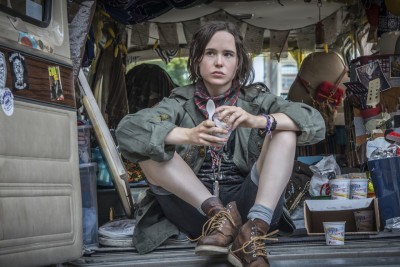
We first meet Tallulah and boyfriend Nico living in Tallulah’s beat-up old van. Living a true vagabond life, the two have been wandering around the country for two years, stealing from shopkeepers and people on the street alike, pulling cons, dumpster diving for food. Tallulah has no family and Nico is estranged from his divorced parents, but for relying on his mother’s gas-station credit card to fill the tank as the two drive from place to place. But Nico’s getting a bit tired of it all. He wants more for himself. So after a heated argument one night, Tallulah or “Lu” as she prefers to be called, wakes up in the van to find Nico and all of his possessions (and her money) gone. Now totally on her own, with no money, and no gas credit card, Lu does the only thing she can do – head to Nico’s Washington Square home in Manhattan. She wants her money back and apparently, Nico as well. But Nico didn’t go home. His mother Margo is there but has no clue where her son is and she wants no part of whatever story Lu is spinning, especially when Lu hits her up for some money.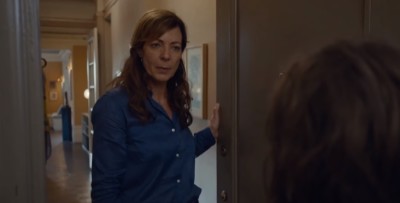
With hunger over-taking her, Lu goes into a full court press with a sure fire con as she sneaks into a hotel in search of half-eaten room service trays left out in hallways. Seeing a tray ripe for the picking, Lu is taken by surprise when hotel guest Carolyn opens her door and sees Lu. Believing Lu to be someone from the hotel to adios the dishes, Carolyn begs Lu to come inside. As Lu and the audience quickly learn, Carolyn has left her husband and is in town to meet up with some rich guy (richer than her already very rich husband) who she believes will sweep her away from a loveless life. Along for the ride with Carolyn Is her one-year old daughter Madison. Unfortunately for Madison, Carolyn has no idea how to care for a child, something that is readily apparent to Lu, herself left alone when she was younger. Unclean, unfed, no clothes, let alone diapers, Madison thinks nothing of peeing on the hotel carpet. And Carolyn is oblivious to it all, worried more about her make-up and dress for the evening. Although it takes some convincing and an offer of “Benjamins”, Lu agrees to babysit Madison.
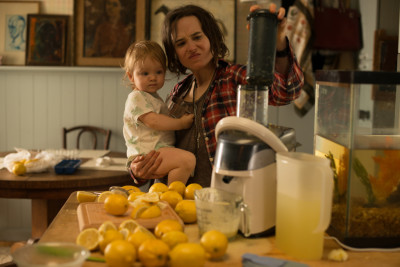
A maternal instinct kicks in with Lu, an instinct of which she may not even be aware. Bathing Madison (and thankfully, herself as well), dressing her, feeding her, the bonding between the two is beyond precious. As the clock ticks down, Carolyn has yet to return from her “date” and Lu finds herself staying well into the night until an exceptionally drunk Carolyn stumbles home to the hotel. Passing out, Carolyn is completely non-responsive and while Lu is ready to jet, the idea of leaving Madison there is more than she can stand. So she leaves – with Madison.
At a loss as to what to now do herself, and realizing she needs help, Lu shows up at Margo’s door with Madison in tow, passing Madison off as Nico’s child. While Margo doesn’t want to believe it, and doesn’t want to let Lu into her home or her life, for the sake of this child, she agrees to take them in for a night or two.
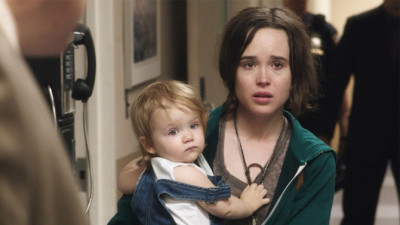
As emotional walls begin to break down for each woman, slowly we learn the reasons behind Margo’s anger and pain and what has closed her off from the world. And we see a correlation with Lu’s life and learn of her hurt and mistrust of others.
In the meantime, Carolyn’s scenario is playing out as the police and social services now involved in the kidnapping of her baby. And thanks to her husband’s anger over her irresponsibility, Carolyn is now completely cut-off from both him and his money, leaving her wandering the streets trying to figure out not only how to survive, but wondering where is her baby.
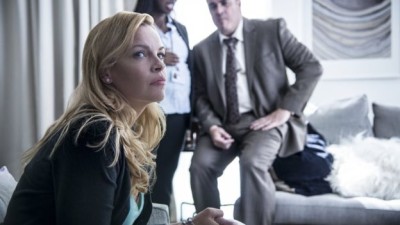
The tension grows as we see the lives of Margo, Lu and Madison converge with that of Carolyn, with each of the adults having that “come to Jesus” moment in their emotional growth, culminating in the re-appearance of Nico.
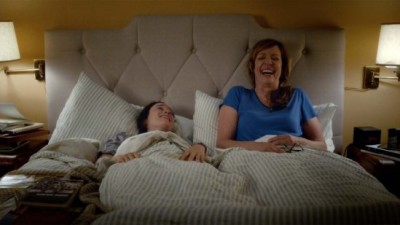
Ellen Page is ideally cast as TALLULAH. She brings a youthful, naivete to the free-spirited Lu. You believe the spur-of-the-moment, impetuosity of acting without thinking but at the same time, Page lets us see the emotional quandary that burdens Lu. Her nuanced facial expressions speak volumes as we see the wheels of maturity start to kick into gear.
And then you pair Page with Allison Janney’s Margo and, as we know already from their work together in “Juno”, it’s a match made in heaven. Janney brings such depth to the role. A telling scene involves the death of Margo’s turtle. She hates the turtle, resents having to even feed it, but when it dies, “she weeps like she’s just lost her spouse.” The conflict within a character that is written on the page becomes full bodied in the hands of Janney. In that scene, Janney connects with us. We realize this woman is barely hanging on. As described her writer/director Sian Heder, “We’ve just seen a window into a thing where there’s so much grief in her that doesn’t have another outlet that it’s coming out over the death of this turtle.” The nuance Janney consistently brings to Margo is resonant and believable. And she even get a few humorous moments of physical comedy thanks to a tentative romantic sub-plot of Margo and her doorman Manuel.
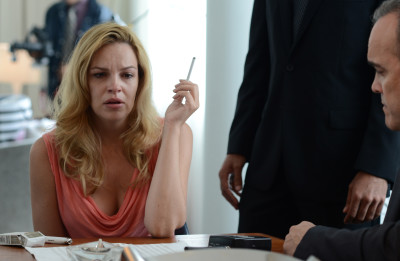
The character and performance that provides the real emotional heart of the film is Tammy Blanchard’s Carolyn. Blanchard plays her so reprehensibly for the first two acts of that film that you hate her. You hate her the minute Lu walks into that hotel room door. It’s like you’re cheering when she takes the baby away. But what makes Blanchard’s performance, and Heder’s direction, so outstanding is that while she makes you want to vilify Carolyn, she creates visible conflict within the character for the audience so that when there is an emotional tip, the audience is right there with her with a kind of empathy. Beautifully played. Notable are the identifiable emotions that Blanchard embodies – nonchalant narcissism, panic, fear, guilt, vulnerability. Standout from both a performance and storytelling standpoint are scenes with David Zayas as the investigating detective and Uzo Aduba as a pregnant child services agent, as they continually express spoken and unspoken disdain for Carolyn, eliciting even more from Blanchard.
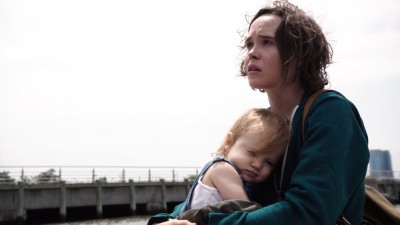
Heder called on her own life experience when it came to writing TALLULAH. Interested in “events in our lives that feel so traumatic and destructive when you’re in the middle of them and that you look back on and think, ‘well that was so inevitable and of course that needed to happen because I would never have grown as a person without that event.’, too take something like the act of stealing a child, make it a reckless, impulsive, well intentioned but outrageous action and have it be the right thing for everyone involved ultimately, was a challenge.” Herself having worked as a nanny at the high end hotels in Los Angeles, Heder had an experience similar to that TALLULAH encounters “with a mother and I really wanted to take her child .” And while Heder would never do such a reckless thing, her thoughts went to a friend who lived out of her van. “I had been writing about her but didn’t really know what I wanted to do with her as a character.” But once she struck on the idea of the bad mother/baby in the hotel scenario, she thought, “Oh my friend would have done it in a heartbeat. She’s just someone who acts purely from her gut. There’s no intellectual censoring coming from higher levels of thinking. I just was interested in what happens. Parenthood is one of the biggest responsibilities that we can choose to take on in life. What happens when someone takes that on from a totally rash, impulsive place and then how does it transform not only her but everyone involved in that action.”
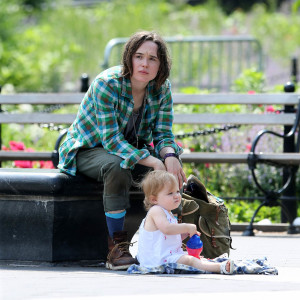
And Heder follows through with the chain reactions, interweaving the lives of not only Lu, but Carolyn, Margo, Margo’s ex-husband Steven and Nico. Each character is fully realized and integrated within the story construct. Appreciated is that Heder takes risks with the creation of these characters. Each has unlikeable traits, yet each has the potential for redemption and to see the characters feed upon one another in moving towards that redemption is moving to watch unfold.

Production values on TALLULAH are extremely high, polished, well designed. From production design to costume to cinematography, Heder’s philosophy of paying attention to detail, pays off handsomely, especially with her cinematography. Cinematographer Paula Huidobro has designed very distinct lensing leading to wonderful visual metaphors. Look at Lu’s van. Huidobro shoots the van interior and thanks to angling and lighting makes it feel claustrophobic yet concurrently expansive. Moving into Margo’s apartment, there is a shift of angle and framing, as well as lighting, embracing Margo’s own closed world with no windows (similar to Lu’s van always having curtains closed and front windshield badly cracked and dirty), tight door frames. Moving into ex-husband Steve’s house, the room is beautifully apportioned with each detail showcased further by floor to ceiling windows creating not only a welcoming lightness, but openness of character, truth telling if you will. A climactic moment in Washington Square Park then captures color, sunlight, vibrancy of life at its most heightened. Each “set” has its own framing and lighting, defining each character.
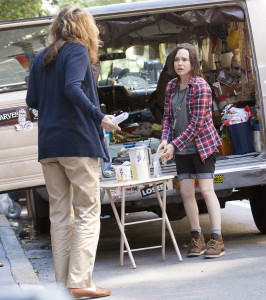
Heder credits the visuals to her pre-production with Huidobro, “going through the script, reading each scene, talking about the emotional reality of the scene and what the audience needed to feel and what the characters needed to feel. And then coming up with one key image that summed up the scene. So we knew if we lost everything, if the sun went down, if we lost the train – if we had that one image, then we had the scene in a visual way. That was great because in a way it got us both on the same page about emotionally where those characters were at in that moment and what the scene needed to feel like so that when we were forced to compromise. . .we knew what those two needed to be in order to do that.” Much of those “necessary” scenes are achieved with handheld lensing that has a spontaneous sensibility, much like TALLULAH herself.
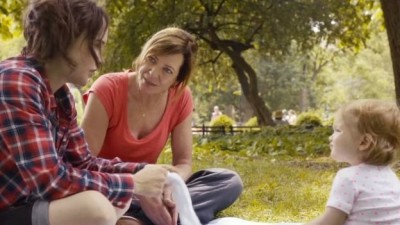
Darrin Navarro’s editing succinctly builds tension while balancing the emotions at play and allowing the audience, and the characters, to feel and to breathe.
Completing the tapestry of TALLULAH is Michael Brook’s scoring. Never overpowering. Never leading. It gently underscores the film’s ultimate beauty.
Written and Directed by Sian Heder
Cast: Ellen Page, Allison Janney, Tammy Blanchard












